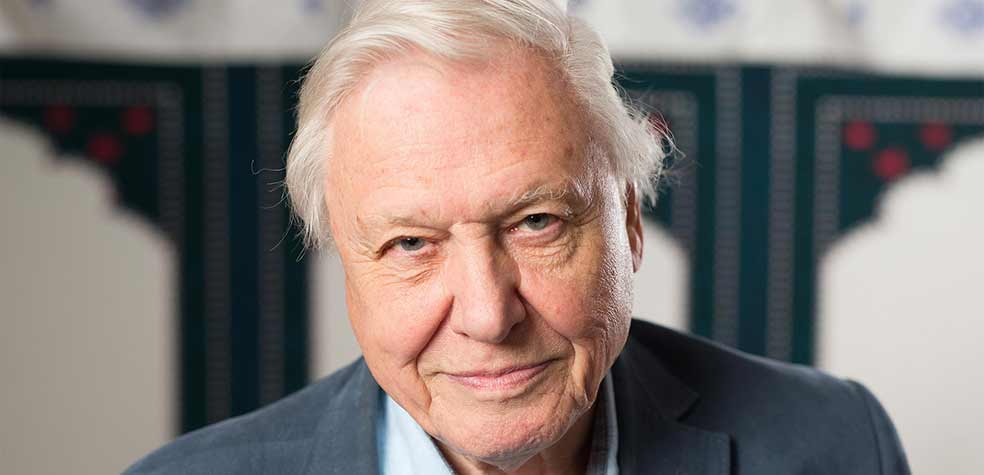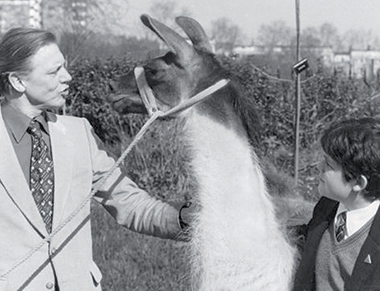On the wildside

Star of the BBC's stunning nature series Planet Earth II, David Attenborough is an Age UK hero: at 90, he is just as passionate about the natural world as he’s always been.
No human being, in half a dozen lifetimes, could see all there is to see of the world. There is always something new. However, that’s not to say it’s only if something is new will it interest me. No matter how many times we film lions capturing wildebeest, it’s still an astonishing sight, and no matter how long you look at a hummingbird suspended in mid-air, it’s still amazing.
I used to have pythons, chameleons, monkeys, stick insects, tropical fish and hanging parrots. We used to go on expeditions in the 1950s to collect animals for the zoo – and I used to bring back maybe 150 of them. Sometimes I’d find a sick animal or perhaps the zoo didn’t want it and I had a bond with it so I’d keep it at home! Things change though, and the zoo doesn’t collect animals in the way it did then. Also, it’s legislation now that you can’t have exotic pets – it’s true, monkeys shouldn’t be pets. The only reason I had them was because they were on their way to London Zoo and were kept in the correct way.
One of the most curious creatures of all the curiosities that I’ve filmed is the greenfly. There could hardly be a commoner creature – for anyone who has a garden – than a greenfly, and yet the female greenfly can produce young without a male and, while she is producing that young, that baby within her already has a baby developing. So you have three generations all at the same time. That is why you can suddenly have tens of thousands of greenflies in your garden.
We haven't lost a major species in my lifetime, but there are a number that are very rare.
There is also a frog that you can freeze solid, all the way through, until it’s as hard as a ball, and yet it will come back to life. We still don’t know a lot about it, but it’s quite interesting to those people who think you could freeze someone and bring them back in another century.
I’ve lived close to Richmond Park for six years. It’s the biggest park in London, and the biggest slab of wildlife in London too. Then there’s the river and Kew Gardens, which is one of the finest botanical gardens in the world. And it’s close to Central London, with its theatres and great restaurants. It suits me very well.
Since I started making television programmes there are three times as many human beings on earth. And we all want houses to live in and we want schools for our children and roads to travel upon. And most of these things have to come from the natural world. We need to recognise what the problem is, and then we can be more sensible about how we invade the natural world, and do it more economically, so we can look after the people who are born onto this planet. Unless we do that, we will spoil the entire world.
Science is proceeding at an extraordinary pace. I mean, if you felt the story of life was in a book and you’ve got to read to chapter 25 and then you’ve learnt it, how boring would that be? It’s continuous discovery and exciting revelation.
I relax on trips with books. I’m currently reading a biography of an extraordinary Newcastle wood engraver called Thomas Bewick, who was a very important figure in ornithology in the 19th century. I used to take a lot of music with me, but I don’t do that so much now.
I would have liked to have seen a marsupial wolf or the dodo.
I also think rather more than I used to. Sometimes it feels you’re almost afraid to think these days, as there are so many things to divert you. I often see younger people wearing headphones and I think, ‘When do they think?’ How can you be alone with your thoughts and work things out if you’ve constantly got rhythms going into your head or you’re always looking at your iPad? When do you have time to think or to talk to other people?
 If I have to fly, I always leave the house with a slight ‘here we go again’ feeling. I don’t get on an airplane with the excitement of sitting in a seat for another 14 hours. The best you can do is to shut your eyes and pretend it’s not happening and wait for it to be over. But soon enough I’ll be out there watching meerkats coming out of their burrows as the sun comes up over the Kalahari Desert, and I think, how can I be so lucky?
If I have to fly, I always leave the house with a slight ‘here we go again’ feeling. I don’t get on an airplane with the excitement of sitting in a seat for another 14 hours. The best you can do is to shut your eyes and pretend it’s not happening and wait for it to be over. But soon enough I’ll be out there watching meerkats coming out of their burrows as the sun comes up over the Kalahari Desert, and I think, how can I be so lucky?
I was never much of a diver. I can dive in tanks and so on. When you dive alongside really good divers, you realise how inadequate you are, and I don’t dive much now – I snorkel.
We haven’t lost a major species in my lifetime, but there are a number that are very rare and some that have been reduced to a handful.There’s a bird in New Zealand called the kakapo, which is a flightless giant parrot; I think we were down to just three females. Because people care, that immediate danger has gone, but it’s still a very rare bird. I would have liked to have seen a marsupial wolf or the dodo, but that’s just me being inquisitive.
Also in this issue
Read more articles from the Winter 2016 edition of Life magazine.
